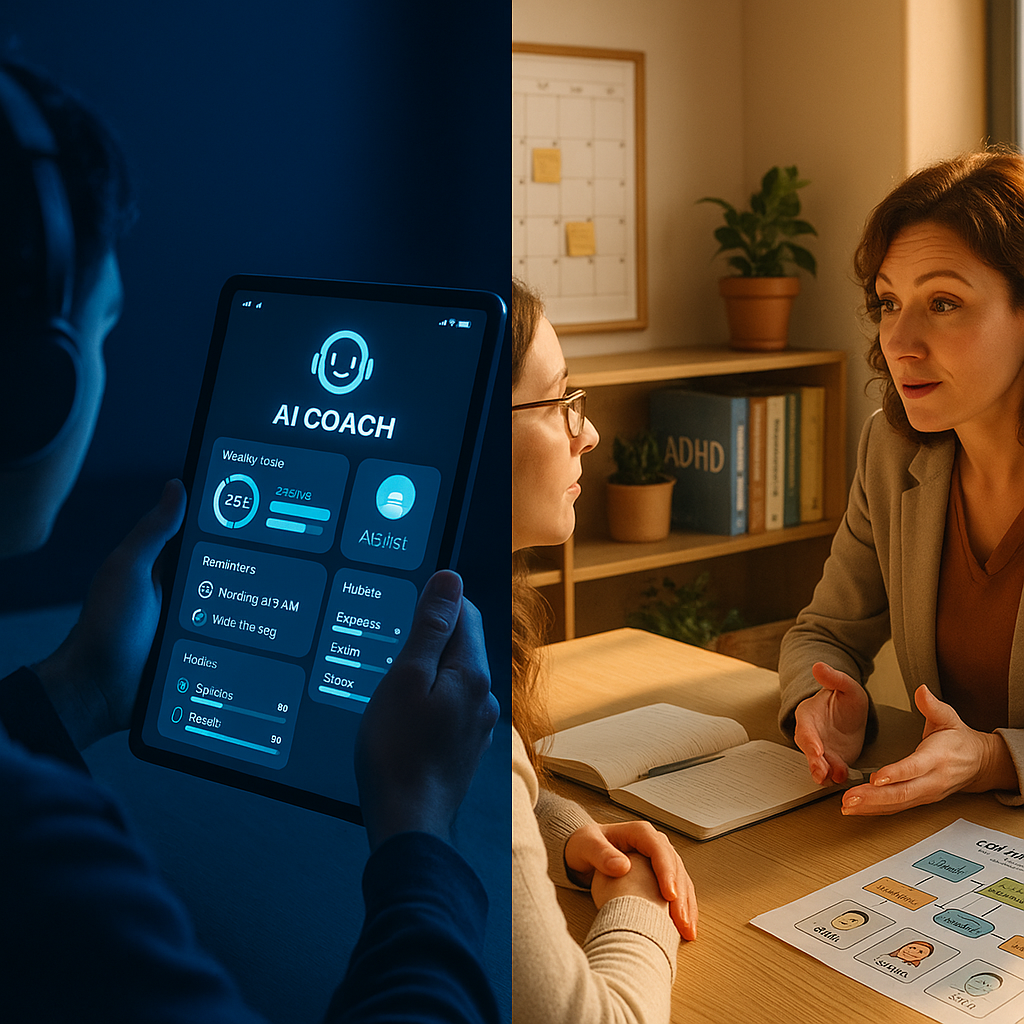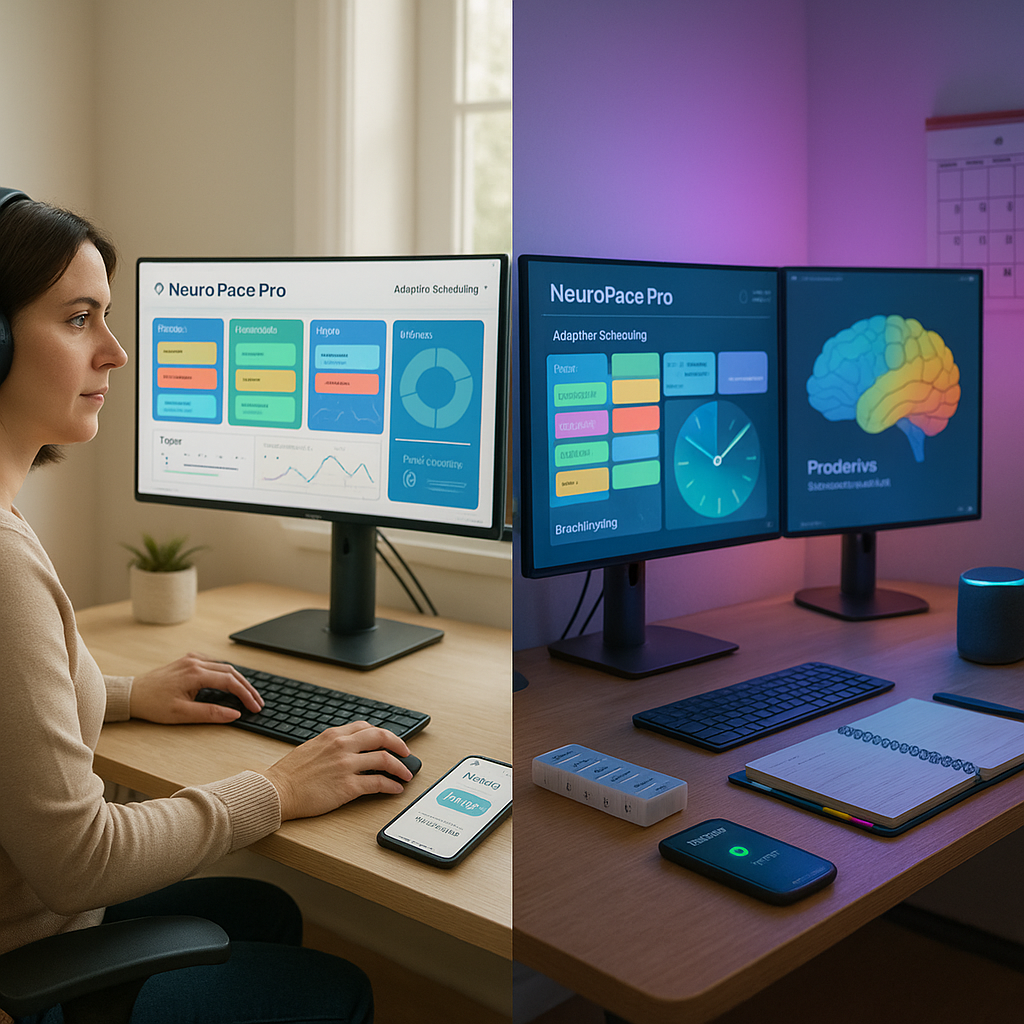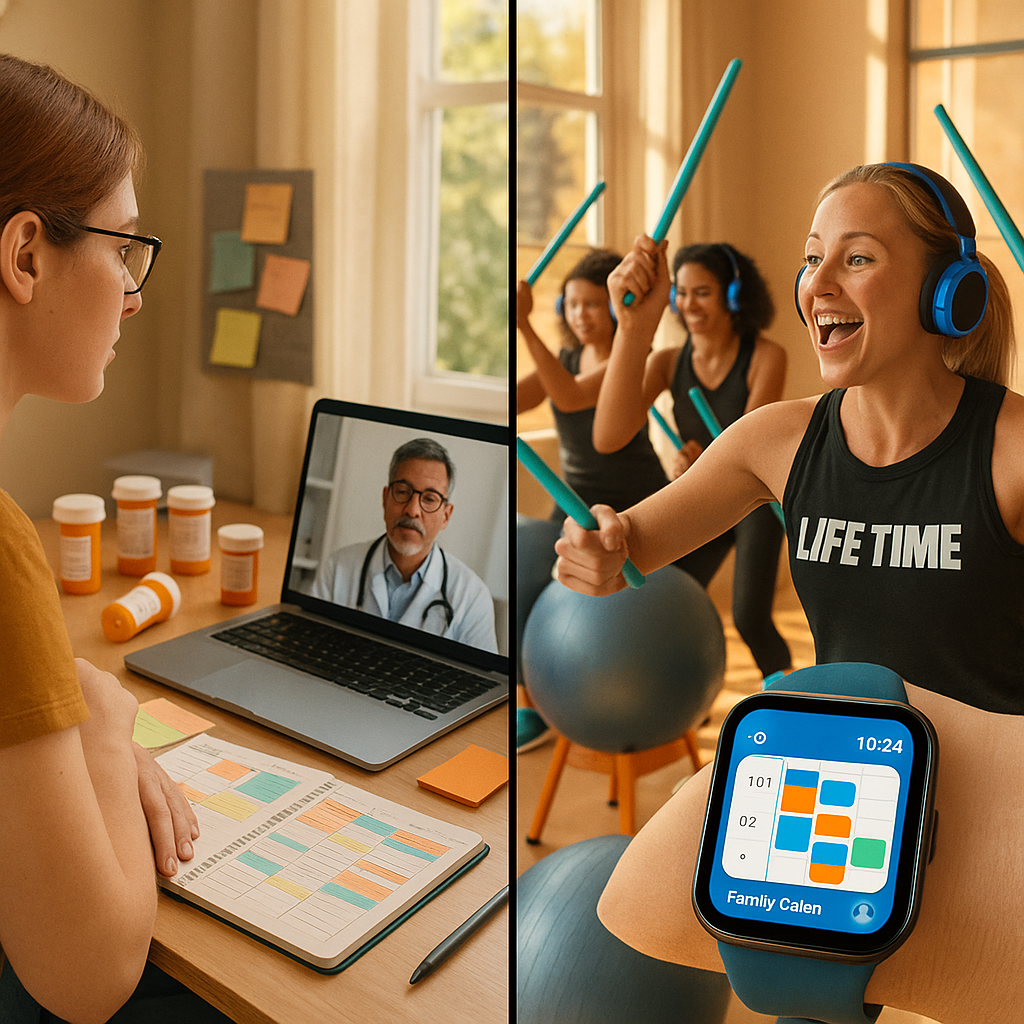Key Takeaways
-
Unlock immediate support with AI coaches 24/7: AI coaching tools offer instant, around-the-clock access, providing users with continuous reminders, progress tracking, and structured routines. This is especially valuable for individuals who benefit from quick check-ins or who struggle with motivation outside traditional business hours.
-
Human coaches deliver empathy and deep personalization: A professional ADHD coach brings lived experience and emotional intelligence to the table. They can adapt strategies in real time, offering understanding and support during setbacks, strong emotions, and nuanced behavioral change.
-
Balance cost and value. AI tools are affordable, but human coaching offers depth: AI coaching apps are usually subscription-based and far less expensive than one-on-one sessions. However, investing in a human coach can be transformative when addressing complex mindset shifts, cultivating accountability, and achieving long-term habit change that goes beyond surface-level tips.
-
Hybrid models evolve with your ADHD journey: The most effective coaching strategy does not require choosing between AI or human support. Many people start with AI tools for foundational structure, then layer in human guidance as their needs grow, or use both for maximum flexibility and personal relevance.
-
Tailor coaching to symptom type and stage: Routine tasks, reminders, and habit tracking often respond well to AI systems. In contrast, emotional regulation, ambitious goal setting, and self-advocacy benefit from the nuanced, real-time feedback that only a human coach can provide. Matching the right tool to the challenge is key to achieving real results.
-
Maximize outcomes by measuring and adapting: The effectiveness of coaching varies from person to person. Regularly review your goals, symptoms, and progress, and be ready to switch between or combine coaching options as your needs shift. This approach helps ensure you continue to grow rather than plateau or pay for services that no longer serve you.
Armed with these takeaways, you can choose a smarter and more personalized approach to managing ADHD, whether that relies on digital assistants, human coaches, or a blend of both. Let’s dive deeper into how to build a coaching toolkit that adapts to your evolving needs.
Introduction
Choosing between an AI coach and a human ADHD coach goes far beyond questions of convenience or budget. It is about finding a source of support that aligns with your specific needs at every stage of your journey. For those navigating ADHD, the right coaching tool can spell the difference between endlessly spinning your wheels and gaining genuine momentum. Whether you need a burst of motivation at midnight or thoughtful guidance through emotional challenges, the right approach can make all the difference.
In this article, we’ll break down the real costs, unique benefits, and optimal moments for both coaching styles. You’ll see how AI-powered tools can provide always-on structure and accountability, while professional ADHD coaches deliver empathy, expertise, and the kind of strategic adjustment that only a real person can offer. We’ll also touch on how hybrid models and stage-based decision-making allow you to customize a support system that meets you where you’re at, both for daily hurdles and long-term goals. Ready to build a toolkit that’s not only affordable, but also genuinely effective? Let’s get into it.
Understanding AI and Human ADHD Coaching
To make an informed choice, it’s important to recognize the fundamental differences between AI-powered and human-led ADHD coaching approaches. Each has its own unique methods and upsides. They tend to cater to different needs and moments in your ADHD journey.
Core Differences in Approach
AI coaching tools and human ADHD coaches operate with fundamentally distinct methodologies. AI coaches rely on sophisticated algorithms and data-driven insights to deliver structured, objective guidance. They analyze significant sets of user data to recognize patterns and provide standardized solutions for task management and productivity.
AI Coaching Characteristics:
- Algorithm-driven responses based on personal inputs
- Pattern recognition and automated recommendations
- Structured interventions consistent across interactions
- Instant access (24 hours a day, 7 days a week)
- Reliable performance without emotional variability
In contrast, human ADHD coaches bring a nuanced perspective, intuition, and adaptability rooted in personal experience and professional training.
Human Coaching Characteristics:
- Emotional intelligence and lived experience
- Flexible adaptation to individual client needs
- Contextual decisions influenced by empathy and real-time feedback
- Support built on an ongoing relationship
- Professional certifications and ongoing development
These distinctions become especially meaningful when you consider whether you need help with complex challenges that require emotional nuance, or just straightforward support for getting stuff organized.
Cost Analysis and Accessibility
Understanding the financial commitment involved with each coaching model can help you find the best value for your needs and budget. Accessibility matters, too—not every option is available everywhere, or at all hours.
AI Coaching Investment
A I coaching platforms commonly use subscription-based pricing structures, making them broadly accessible and scalable.
- Basic Tier: $15-30 per month
- Premium Tier: $40-75 per month
- Enterprise Solutions: $100-200 per user per month
These plans usually provide unlimited AI interaction. However, advanced features or deeper integrations may be reserved for higher-level subscriptions. The relatively low cost makes AI accessible to a wide audience, including students or early-stage professionals.
Human ADHD Coaching Expenses
Professional ADHD coaching requires a higher initial financial investment, reflecting the value of personalized, one-on-one engagement.
- Individual Sessions: $100-250 per hour
- Monthly Programs: $400-800 per month
- Intensive Packages: $1,500-3,000 per quarter
- Group Coaching: $200-400 per month
Some coaches offer sliding scale options, payment plans, or may be covered partially by insurance (if that’s available based on your region and provider). While the costs are higher, the return can be significant, especially when coaching unlocks major personal or professional breakthroughs.
Comparing Benefits and Limitations
When deciding between AI and human coaching solutions, it helps to weigh each against your unique needs, lifestyle, and preferences.
AI Coaching Advantages
- Constant Availability: Get support whenever you need it, regardless of time zone or schedule.
- Consistent Performance: AI doesn’t tire, lose focus, or introduce personal bias. It provides predictability and reliability every time.
- Data-Driven Insights: Take advantage of detailed tracking, reminders, and actionable analytics on your habits and routines.
- Cost-Effectiveness: Broad access at a lower price point breaks down barriers for many people at various points in their ADHD journey.
- Scalable Support: AI tools can serve hundreds or even thousands of users at once, making them ideal for both individuals and organizations.
AI coaching is particularly strong for task-based guidance and routine-building in pretty much any industry. Think healthcare (reminders for medication or appointments), education (students managing assignments), or the workplace (tracking productivity and deadlines).
Human Coaching Strengths
- Deep Emotional Connection: Coaches offer authentic empathy and can build trust-based relationships that foster not just change, but lasting change.
- Complex Problem Solving: Humans can adapt strategies when life takes a sharp turn, especially for layered or emotionally charged challenges.
- Accountability Partnership: A coaching relationship can inspire a lot more drive for results and personal responsibility.
- Experiential Guidance: Get practical tips grounded in years of lived and professional ADHD experience.
- Professional Expertise: Stay up to date with best-in-class knowledge and methods, since good coaches never stop training and learning.
Human coaches really shine when you’re facing tougher, more complex challenges. At work, they can guide professionals through burnout or career change. For entrepreneurs, they offer tailored advice for balancing business growth with, well, staying sane. In healthcare, social, and education settings, they bring context and sensitivity.
Effectiveness and Outcome Measurement
Tracking your progress is crucial to making sure your investment in coaching—AI, human, or both—translates into real, measurable results. The two models focus on different metrics.
AI Coaching Metrics
AI coaching platforms usually focus on quantitative measures, including:
- Task or assignment completion rates
- Streaks and habit adherence
- Time management improvements
- Achievement of specific, trackable goals
- User engagement frequency and interaction patterns
These metrics offer a clear, data-backed snapshot of productivity gains and habit formation. If you’re in finance, an AI coach can remind you about daily money management. In marketing, it’s about keeping professionals on top of projects. In education, it’s making sure assignments get in on time.
Human Coaching Assessment
Human coaches evaluate progress using both observable and subjective criteria, such as:
- Behavioral changes in routines or coping strategies
- Emotional self-regulation and resilience
- Improvement in relationships at work or home
- Professional growth and a sense of self-efficacy
- Overall satisfaction and life quality from the client’s point of view
The more holistic lens of human coaching captures both visible and invisible wins—for example, a boost in self-esteem, or feeling confident to reach out for help. That’s especially important when you’re dealing with bigger, multidimensional challenges.
Making the Right Choice
The decision between AI and human ADHD coaching should line up with your current goals, challenges, and where you are on your personal development path.
Stage-Based Decision Making
Take stock of where you are in your ADHD journey. Let that guide your pick:
- Early Stage:
- AI coaching works well for task management, habit formation, and learning foundational strategies. This might mean relying on a digital coach for daily reminders and skill-building in the beginning.
- Intermediate Stage:
- Combine AI and human coaching for support on different levels. Use digital tools for structure and accountability, and schedule some human sessions to tackle new blocks or tweak your approach.
- Advanced Stage:
- Lean into human-centric coaching for working on mindset, emotional triggers, major life transitions, and building relationships. A coach’s flexibility and insight become critical here.
Hybrid Implementation Strategies
Plenty of people and organizations are already blending both approaches. Common hybrid approaches include:
- Using AI-driven apps for reminders, tracking, and check-ins every day.
- Scheduling human coaching calls (maybe weekly or monthly) to adjust tactics or talk through new challenges.
- Following up on a coach’s advice with AI accountability pings.
- Letting AI keep you on track between sessions, especially when life gets intense.
This kind of layered approach offers ongoing structure, backed by deeper support and flexibility as needed.
Customization and Personalization
A key to ongoing success in ADHD coaching, whatever the method, is how well the support is tailored to your individual needs.
AI Adaptability Features
Modern AI coaching solutions are becoming more personalized, with features like:
- Algorithms that learn and adapt as you go
- Customizable notifications, prompts, and reminders
- Flexible checklists for tracking goals across work, school, and life
- Integrations with scheduling and habit apps
- Automatic difficulty scaling to match your challenge level
For anyone who craves structure or an extra layer of support that fits a unique schedule, AI can be a real game-changer.
Human Coach Personalization
Human coaches raise the bar with:
- Custom strategies that factor in the whole picture of your life and goals
- Methods that evolve in real-time, based on your feedback and circumstances
- Cultural, family, and workplace sensitivity
- Flexible communication (video, phone, chat—whatever works for you)
- Accountability tailored to your motivations and challenges
That deeper level of customization is extra valuable for entrepreneurs, people in high-pressure roles, or anyone managing ADHD alongside other life events or neurodivergence.
Conclusion
Choosing between AI and human ADHD coaching isn’t about figuring out which one is “better.” It’s about creating a system of support that fits your needs, your preferences, and your budget. AI coaching offers 24/7, data-driven help, making it an accessible pick for habit-building, accountability, and affordable check-ins. Human coaches bring empathy, deep understanding, and a relationship-driven approach—key for tackling bigger emotional or context-heavy challenges.
For most of us, the best path borrows from both worlds. By blending the always-on reliability of AI with the transformative expertise of real-life coaches, you get a system as flexible as your mind. As technology continues to evolve and hybrid models spread across healthcare, education, business, and beyond, your power to tailor support only grows.
In this new era, people with ADHD have more opportunity than ever to turn challenges into advantages, building systems that grow with them and highlight what makes them unique.
So in the end, it’s not really about AI vs. human or even hybrid vs. solo. It’s about how you’ll use these tools—together—to unlock the future (and focus) you deserve.





Leave a Reply